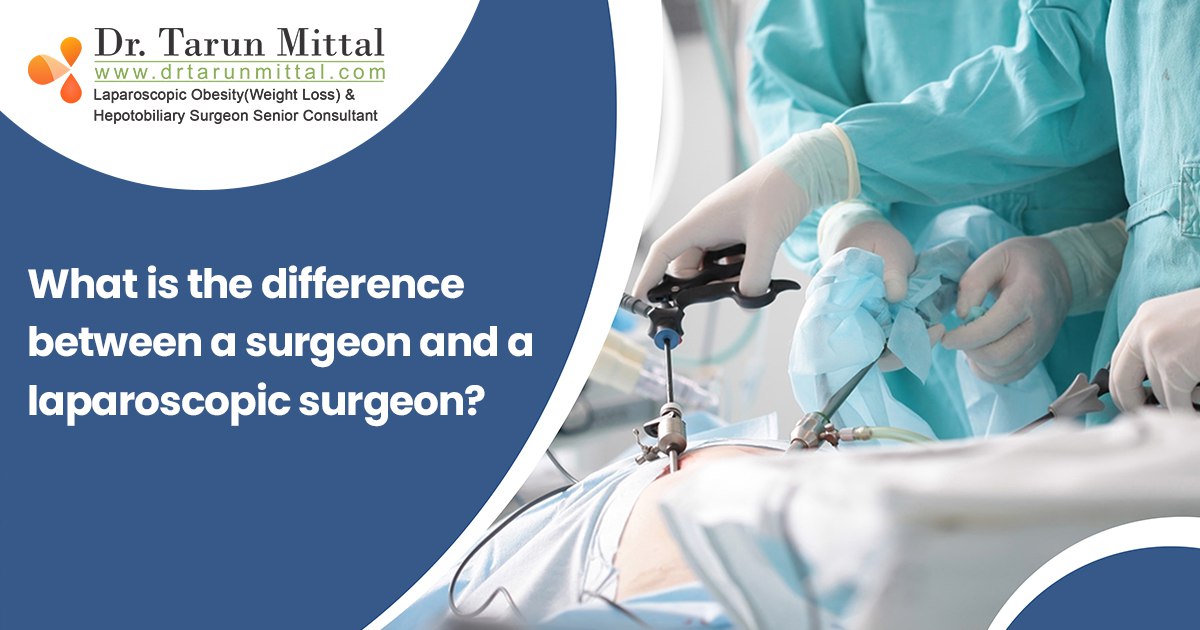
Difference between a surgeon and a laparoscopic surgeon
When facing surgery, many patients are unsure about the roles and specialisations of the doctors involved. One common question is:
Now you can book an appointment here with Dr. Tarun Mittal Best Bariatric Surgeon in India

Laparoscopic surgery is a minimally invasive technique used in a wide variety of general surgeries, including bariatric surgery. Many bariatric surgeons have received the necessary training to perform laparoscopic bariatric surgeries and offer patients this less invasive surgical option.

Obesity is defined as an excess accumulation of body fat that leads to pathology. Obesity is a disease that has assumed epidemic proportions today, Consult Best Obesity Treatment in Delhi. Obesity refers to a spectrum of problems of excess weight, ranging from mild overweight to severe obesity.

Robotic surgery, computer-assisted surgery, and robotically-assisted surgery are terms for technological developments that use robotic systems to aid in surgical procedures. Robotically-assisted surgery was developed to overcome.
Dr. Tarun Mittal presently is Senior Consultant Surgeon With Special Expertise In Laparoscopic , Obesity and Thoracoscopic Surgery at Sir Ganga Ram Super Speciality Hospital, Rajinder Nagar, New Delhi, India, which is among the best hospitals in India.













When facing surgery, many patients are unsure about the roles and specialisations of the doctors involved. One common question is:

Obesity is not just a cosmetic concern—it’s a serious medical condition that can lead to life-threatening health issues such as

Obesity is a growing health concern that affects millions of individuals across the globe. When lifestyle changes and medical treatments
Bariatric surgery, often known as weight loss surgery, is carried out to assist a person who is extremely obese in losing weight. It aids a person in consuming fewer calories by shrinking the stomach and altering the structure of the digestive tract.
By limiting the amount of food you may eat and altering how your body absorbs nutrients, weight loss surgery aids in weight loss.
Smaller incisions, less discomfort and bleeding, a lower risk of infection and problems, a quicker hospital stay and recovery period, less scarring, and better cosmetic outcomes are just a few benefits of laparoscopic surgery versus open surgery.
By modifying the digestive tract, bariatric surgery is a form of surgery that helps obese patients lose weight. Gastric bypass, gastric sleeve, gastric banding, and duodenal switch are a few of the numerous types of bariatric surgery.
Any surgeries have some risk, even though bariatric surgery typically does. But qualified surgeons like Dr Tarun Mittal and their team, who use modern instruments and cutting-edge technologies, help reduce complications.
Gallstones are hardened deposits that form in the gallbladder, a small organ located beneath the liver. They can vary in size and composition and may cause symptoms such as abdominal pain, nausea, vomiting, and jaundice.
A hernia occurs when an organ, such as the intestine, pushes through a weak spot in the surrounding muscle or connective tissue. It can cause a visible bulge under the skin and may result in discomfort or pain, especially during physical activity.
While laparoscopy, gallstone removal, and hernia repair are generally safe procedures, there are some potential risks and complications. Such as infection, bleeding, damage to surrounding organs or blood vessels, and anaesthesia-related risks. Better to consult experts such as Dr. Tarun Mittal.
Recovery time can vary depending on the individual and the specific procedure. Generally, patients can resume normal activities within a week or two after laparoscopic surgery. However, it’s important to follow your surgeon’s instructions.